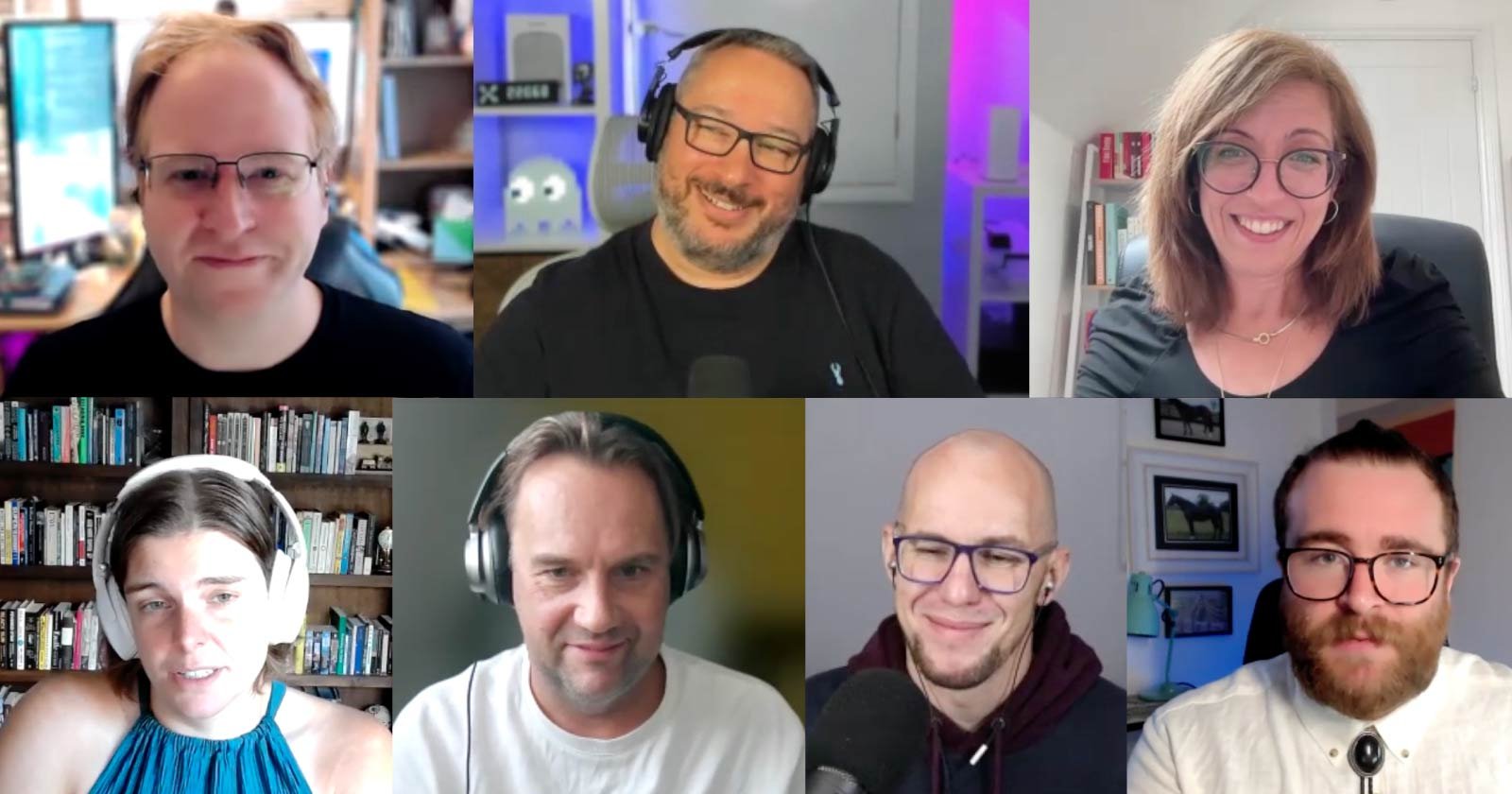Generative AI and the introduction of AI Overviews to SERPs have dominated this year as search has changed more in the last year than in the last 10 or 20 years.
But it might be that many of these changes are coming in spite of Gen AI and not because of.
SEO has been maturing and aligning with classic marketing for many years. AI has been the catalyst that has now created an urgency to rethink SEO strategies and start to approach SEO in a digital marketing holistic way.
SEO is no longer about just being visible in SERPs. Consideration is also needed for visibility in Gen AI apps, social media, and any channel where your audience might be.
Search traffic will likely become more fractured across different channels, and an SEO’s job will become much more complex. The days of easy traffic are well in the rearview mirror.
For the last six months, I interviewed a series of the smartest minds in SEO about their thoughts on AIO.
I asked them all the same question: “What do you think about AI Overviews? How will they impact the industry, and where is this going?”
7 SEO Experts Share Their Thoughts About AI Overviews
The most interesting part about asking the same question to different people is that you get a wide variety of answers – all approaching from different angles.
All of the excerpts below are just an extract and summary taken from a series of short videos.
It’s worth watching each of the videos in full to get the nuance and detail of what each of the experts has to say.
Pedro Dias: AI Is Raising The Bar For Knowledge
I started by speaking to Pedro Dias earlier in the year.
Ex-Googler Pedro has always been focused on user experience, and he believes Gen AI is widening the gap between generalists and true specialists. And that real expertise will be more valuable than ever. It’s the middle ground that will be displaced.
Pedro also believes in building communities and considering the customer journey – where you can give away content for free and where you gate your most valuable resources for your audience.
“The real value lies in crafting more comprehensive materials. Ideally, these should be gated or shielded from Google, allowing us to funnel readers genuinely interested in deeper insights into our platforms. This approach protects our assets and enables us to nurture a loyal audience who seeks value beyond surface-level information.
Professionals need to determine what they can safely offer to AI for broad discovery and what content should remain exclusive to their clients. Every business must identify this balance. While competition will compel some to disclose more detailed content, creators must decide where to draw the line between free and premium offerings.
AI is raising the bar for knowledge. It’s widening the gap between generalists and true specialists, making deep expertise more valuable than ever. Middle-ground professionals, who rely on surface-level knowledge, are at risk of being displaced.
The industry will thrive on the backs of those investing in research, innovation, and specialized knowledge. Others may settle for AI-generated information, but there will always be an audience that seeks deeper insights and expertise.”
Erika Varangouli: SEO Cannot Be Independent Of Brand
Erika believes that we have been spoiled previously, as SEO was not as complex as it is today.
Search used to focus on keywords and clicks, which is a much more one-dimensional approach than what we face today.
She also believes that creativity and branding are essential moving forward.
“20 years ago, you’d just write stuff about car insurance – ‘best car insurance’ – and make sure you had it everywhere.
So, in reality, it wasn’t about understanding or satisfying an audience. But as online behaviors, features, and capabilities have developed, we couldn’t just continue doing SEO that way.
I think moving forward, one of the predominant skills is going to be creativity. SEO has always been about strategy and strategic thinking, but now, more than ever, it’s going to require creativity. And that will probably be the edge we have over AI.
It’s becoming clearer that SEO cannot work outside of understanding the basic principles of marketing, psychology, and branding.
I think something that’s been obvious for a long time is that SEO cannot be independent of brand. But it was functional even if you ignored it for a long time.
I think we’ve passed the point now where we cannot ignore it. SEO reports that rely on rankings, clicks, or traffic won’t look great, but how SEO can really bring results is through collaboration with other marketing disciplines and the business as a whole.
Think about the audience, owning the conversations – not owning the clicks – and you should be fine.”
Jono Alderson: Understanding The Problems Your Audience Has Will Be Crucial
Jono believes that AI Overviews are a symptom of a bigger change and that it was never Google’s objective to be a list of 10 blue links.
What they have always aspired to is to understand what you want and solve your problem.
“This 20-year period we’ve had of typing into an input box and getting a list of links was a temporary dysfunction on that journey.
Now, we’re seeing the first chapter of where they really wanted to get to, and that has some big changes. The obvious ones are things like zero-click searches becoming more prolific, where people type or speak something, and Google solves the problem in situ.
This has huge impacts on the web’s economic model – not just for sites relying on conversions but also those relying on clicks for advertising.
Google’s own advertising ecosystem, which relies on visits to ad-running websites, is affected, too. Everyone, including Google, is still figuring out what this all means.
The model of creating content just to bridge traffic to websites is falling apart because Google and users no longer need that content.
In many cases, Google’s AI-generated results will be better because they’re unbiased, multi-sourced, up-to-date, and not selling a specific product.
Producing content for keywords just to rank may not be the future of SEO. While being topical, newsworthy, or adding truly new value still works, if your strategy is based on just writing articles, there’s an existential crisis at hand.
Understanding the problems your audience has will be crucial. Instead of focusing on keywords or the products people want, we need to focus on the frustrations they have before they start searching.
I think conventional user research – surveys, asking questions – will be more important than building spreadsheets of keywords. Moving away from keywords and understanding human needs will be key.
Search behavior is already shifting. We need to stop thinking about just typing queries into Google.
People are searching on TikTok and Instagram, and even using voice commands with their smart homes. Brand discovery and awareness will play a bigger role, and we’ll need to adapt by creating content that’s useful, relevant, and trustworthy.”
Mark Williams-Cook: Branded Search Is The Gold Standard
Mark’s opinion is that we’re in an odd place and sitting on the fence between two technologies. He thinks that there is a disconnect between user expectations and search engine capabilities.
“The key point here is that with AI models like LLMs and overviews, we’ve introduced a new way and expectation for users.
Now, they can ask tools like ChatGPT a question as if they’re talking to another person and receive a direct answer.
The danger is that most people don’t understand how AI works or realize it can make mistakes.
Google has built trust over 20 years, so people assume its answers are accurate, even though AI Overviews have produced some very incorrect results.
The issue is users aren’t aware of AI’s limitations, so when an Overview gives faulty information, people’s defenses are down. They trust Google and assume AI is inherently ‘clever’ without realizing it can produce biased or inaccurate responses.
There are knowledge spaces, or ‘solved knowledge spaces,’ as Jono Alderson calls them, where information doesn’t change much, like a lasagna recipe. I think AI Overviews are useful in these areas, which might reduce traffic to sites focused on this kind of content. However, it’s honestly a relief to see less repetitive content online.
For industries impacted by AI overviews, it might be time to shift focus rather than trying to fit old practices into the new landscape.
The blended SERPs will focus more on overall presence, not just page optimization. It’s about where and how frequently your brand is mentioned across the web, more like digital PR. This favors brands with a broad digital footprint.
Ultimately, branded search – people searching specifically for your brand – is the gold standard, and I think that’s where AI overviews could push us.”
Dan Taylor: ChatGPT Search Will Lay The Groundwork For Significant Changes
I spoke to Dan a few days after ChatGPT Search launched. Dan conducted some initial research and testing on how the AI search engine handled queries.
He believes that in its current state, ChatGPT Search would not appeal to the mass market as it felt lacking. He thinks it is still raw and rugged and perhaps not quite ready for a broad audience of non-tech users.
But, he does think this could be a big moment similar to the introduction of Ask Jeeves (for those who remember). It pioneered a different approach to search modeling, and ChatGPT Search will be influential.
“ChatGPT Search is very query-dependent. For local search, for instance, it wasn’t a great experience. I noticed that, with niche or specific queries, it had a better logical structure.
For example, in a recent search for sports scores, Google prioritized the dominant, common interpretation over timeliness.
ChatGPT Search, however, better understood the fresh intent of the query. It wasn’t visually polished, but the information was accurate and elaborate.
In terms of SEO, if ChatGPT Search gains traction, SEOs will need to adapt to optimize for this new format. The summaries in AI Overviews are already doing a lot of the work for users, but there’s an open question about accuracy and trustworthiness that’s fundamental to how this will develop.
I think it has the potential to be a pioneering force in AI-powered search. This could be the ‘Ask Jeeves’ moment for AI search, helping to establish the landscape for a new wave of competition.
We’re in a different ecosystem now, and OpenAI is heavily funded. Whether it remains at the forefront, or another big player steps in, ChatGPT Search will at least lay the groundwork for significant changes in search.”
Alli Berry: Combining AI With A Strong Sense Of Brand Will Lead The Future
Alli predominantly works in the finance space, so her experience has not been impacted as much as other verticals. Currently, Google limits AI Overviews in Your Money or Your Life (YMYL) SERPs.
Like many others, she believes that a shift to branding is needed and that smaller companies will need to engage audiences directly, and reduce their reliance on Google.
“I don’t have a strong yes or no opinion on these Overviews; I see them as the next generation of disruption at the top of the SERPs.
Now, it’s on us as practitioners to figure out how to make the most of them. I’ve had great success with featured snippets in the past, so I hope we can replicate that with AI Overviews.
I think the space will have to change. Right now, the financial industry feels very transactional, and there’s not much emphasis on building long-term relationships or communities.
Few finance sites do this well, and it’s a huge opportunity. Smaller companies will need to collect user information, engage audiences directly, and reduce their reliance on Google.
If brands don’t adapt, they’ll fade out. Quick-hit search answers won’t sustain them in the long run. Whether in finance or another industry, brands need to focus on recognition and audience growth.
That requires thoughtfulness and an effort to create something people want to connect with. This change, while challenging, will improve the brands that survive.
We’ve come full circle to classic marketing. Building brand recognition is vital.
Digital marketing went through a phase of undervaluing traditional advertising because it was hard to measure ROI. But now, it’s about creating brand associations, being visible, and providing value to audiences through direct content like newsletters.
Brands that combine AI with a strong sense of brand will lead the future. That combination is critical moving forward. “
Arnout Hellemans: It’s More About Experience Optimization
Arnout thinks we are on the verge of a big shift. Google must reinvent itself, but its focus right now seems to be on competing with Amazon.
There could be a future where Google integrates its accounts so you can make purchases directly within the search interface.
He can see that the younger generations are using TikTok and Snapchat instead of Google. He also thinks that to create demand in search volume, you need to create hype on those platforms.
Arnout is also driven by creating better user experiences and focusing on conversions and not clicks. He believes that we should optimize websites not just for traffic but to help people convert.
“Google had the technology to launch something like ChatGPT before OpenAI, but they didn’t because they knew it would hurt their bottom line. They were forced into it when people flocked to ChatGPT. Now, with so many alternatives, Google has to adapt.
With the launch of ChatGPT Search, how much market share will it take from Google? I think it’ll be significant. Brave, Perplexity, and other engines will nibble at Google’s dominance.
Most of these searches are informational, so initially, it might not cut into ad revenue. But, as users shift from informational searches to comparisons and eventually purchases, the impact will grow.
Google could already provide a similar experience but hesitates because of shareholder value. It’ll be interesting to see the initial market share data.
If they lose a small percentage, it might be manageable, but if they lose 10% or more, they’ll have to act quickly. Ad revenue may still rise in the short term due to higher CPC prices, but [in the] long term, the competition is fierce.
Younger generations are gathering knowledge from TikTok. It’s fascinating. Most of their knowledge comes from there. The biggest spikes in Google Trends now are TikTok trends.
To generate search volume, you need to hype solutions on platforms like YouTube, Instagram, and TikTok. That’s how you create demand.
It’s fascinating to think about the younger generation’s habits. They even use Snapchat over Google Maps now. It’s hard for us to imagine, but that’s their reality.
I think we’re moving towards an age where it’s not about sheer traffic but about delivering a truly optimized experience. The old age of SEO is gone.
It’s more about experience optimization – truly delivering the best experience ever. “
What We Can Takeaway About AI Overviews
Although we have seven different responses to the same question, the common themes and what we can take away from these conversations are to:
- Leverage your expertise and deep knowledge with your audience.
- Focus on brand building and building your audience.
- Build communities around your brand.
- Create content that solves problems.
- Embrace TikTok in the user journey to find information.
- AIO mostly takes away informational queries that don’t hold any conversion value.
- Focus on conversion and not clicks.
Thank you to all the experts who appeared as guests on IMHO and offered their time and opinions.
More Resources:
Featured Image: Deemerwha Studio/Shutterstock



